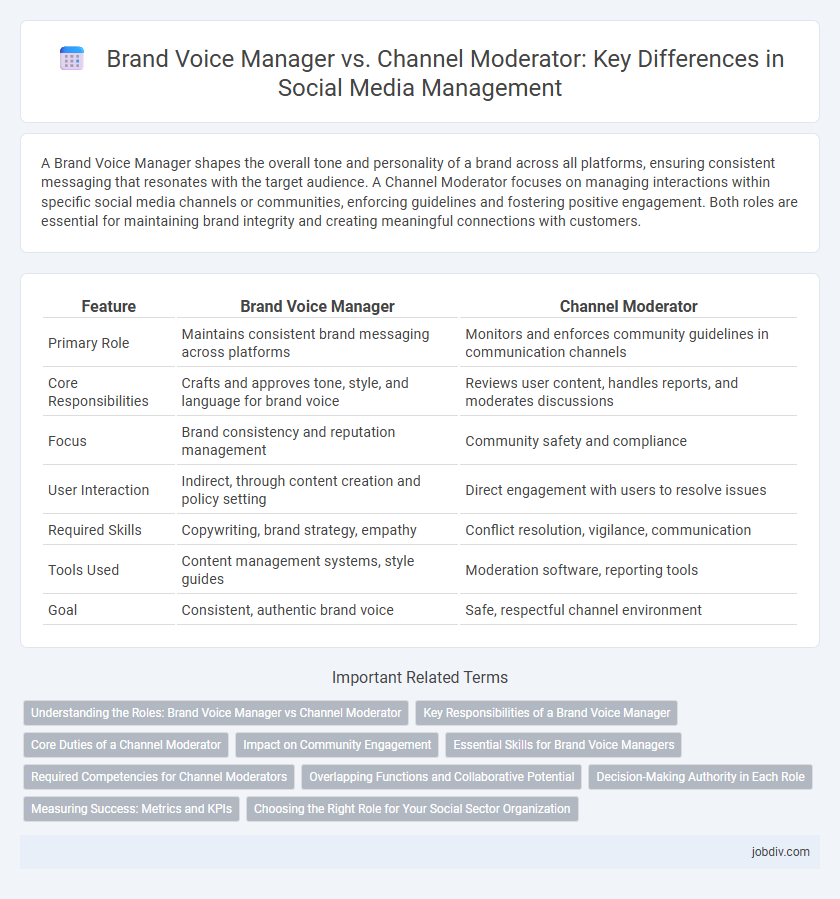A Brand Voice Manager shapes the overall tone and personality of a brand across all platforms, ensuring consistent messaging that resonates with the target audience. A Channel Moderator focuses on managing interactions within specific social media channels or communities, enforcing guidelines and fostering positive engagement. Both roles are essential for maintaining brand integrity and creating meaningful connections with customers.
Table of Comparison
| Feature | Brand Voice Manager | Channel Moderator |
|---|---|---|
| Primary Role | Maintains consistent brand messaging across platforms | Monitors and enforces community guidelines in communication channels |
| Core Responsibilities | Crafts and approves tone, style, and language for brand voice | Reviews user content, handles reports, and moderates discussions |
| Focus | Brand consistency and reputation management | Community safety and compliance |
| User Interaction | Indirect, through content creation and policy setting | Direct engagement with users to resolve issues |
| Required Skills | Copywriting, brand strategy, empathy | Conflict resolution, vigilance, communication |
| Tools Used | Content management systems, style guides | Moderation software, reporting tools |
| Goal | Consistent, authentic brand voice | Safe, respectful channel environment |
Understanding the Roles: Brand Voice Manager vs Channel Moderator
A Brand Voice Manager shapes and maintains a consistent brand identity across all communication channels, ensuring messaging aligns with company values and target audience expectations. In contrast, a Channel Moderator monitors and manages user interactions within specific online platforms, enforcing community guidelines and fostering engagement. Both roles are crucial for preserving brand reputation and facilitating meaningful social interactions, but they differ in strategic scope and operational focus.
Key Responsibilities of a Brand Voice Manager
A Brand Voice Manager oversees the consistent tone and messaging across all social media platforms, ensuring alignment with the company's values and strategic goals. They develop content guidelines, craft communication strategies, and monitor brand sentiment to maintain a coherent and engaging brand presence. Unlike Channel Moderators who primarily enforce community rules and manage user interactions, Brand Voice Managers focus on shaping the brand's identity and fostering long-term audience trust.
Core Duties of a Channel Moderator
Channel Moderators are responsible for maintaining a positive and respectful environment within social media channels by enforcing community guidelines, filtering inappropriate content, and managing user interactions. They actively monitor conversations to prevent spam, harassment, and off-topic discussions, ensuring compliance with brand standards and facilitating constructive engagement. Unlike Brand Voice Managers, whose primary focus is crafting consistent messaging and tone, Channel Moderators prioritize real-time moderation and user behavior management to uphold community integrity.
Impact on Community Engagement
Brand Voice Managers shape and maintain a consistent tone across all brand communications, fostering trust and loyalty within the community. Channel Moderators facilitate real-time interactions and enforce community guidelines, ensuring a safe and positive environment for engagement. Together, they enhance community engagement by balancing brand consistency with dynamic, moderated conversations.
Essential Skills for Brand Voice Managers
Brand Voice Managers excel in strategic communication, ensuring consistent tone and messaging across all platforms to reinforce brand identity. They possess advanced skills in audience analysis, content creation, and emotional intelligence to craft authentic and engaging brand narratives. Mastery of cross-channel coordination and data-driven insights enables Brand Voice Managers to adapt messaging dynamically, distinguishing them from Channel Moderators who primarily focus on community engagement and content moderation.
Required Competencies for Channel Moderators
Channel moderators require strong communication skills, cultural sensitivity, and real-time problem-solving abilities to effectively manage community interactions and maintain positive engagement. They must possess a deep understanding of platform guidelines, conflict resolution techniques, and quick decision-making to enforce community standards without escalating tensions. Proficiency in digital tools for monitoring conversations and identifying trends is essential for moderators to support brand reputation and foster user trust.
Overlapping Functions and Collaborative Potential
Brand Voice Managers and Channel Moderators share responsibilities such as monitoring audience engagement, ensuring content aligns with brand guidelines, and managing real-time interactions across social media platforms. Both roles contribute to maintaining a consistent brand identity and addressing customer inquiries or feedback to enhance online reputation. Collaboration between these positions fosters cohesive communication strategies and efficient handling of community dynamics, optimizing overall brand presence.
Decision-Making Authority in Each Role
Brand Voice Managers hold primary decision-making authority over brand messaging, tone, and strategic communication direction across all social channels. Channel Moderators focus on real-time interaction management, enforcing community guidelines, and addressing user comments without altering the overarching brand narrative. This separation ensures Brand Voice Managers maintain consistent brand identity, while Channel Moderators facilitate responsive and compliant community engagement.
Measuring Success: Metrics and KPIs
Brand Voice Managers focus on overall brand sentiment, engagement rates, and consistency across multiple platforms to measure success, using metrics like Net Promoter Score (NPS) and brand mention growth. Channel Moderators prioritize real-time interaction metrics such as response time, resolution rate, and user sentiment within specific channels to assess performance. Both roles rely on qualitative analysis of user feedback and quantitative data to optimize community health and brand perception.
Choosing the Right Role for Your Social Sector Organization
Selecting the right role between a Brand Voice Manager and a Channel Moderator is crucial for social sector organizations aiming to enhance engagement and maintain community trust. A Brand Voice Manager crafts consistent messaging that aligns with organizational values and mission statements, fostering a strong, authentic public image. In contrast, a Channel Moderator actively manages online interactions, ensuring respectful dialogue and mitigating conflicts to uphold a safe, supportive community environment.
Brand Voice Manager vs Channel Moderator Infographic

 jobdiv.com
jobdiv.com